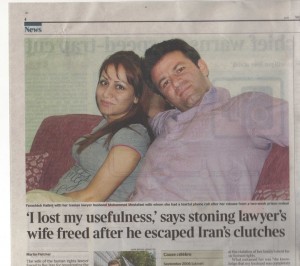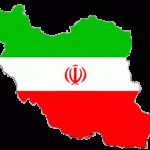
2000 GMT: Picture of the Day. Human rights lawyer Mohammad Mostafaei, now in Norway, and his wife, recently released from prison. [Photo credit:
The Times]
1715 GMT: Back to the Bazaar.
Radio Free Europe/Radio Liberty carries a profile from the Tehran Bazaar, which was on strike last month, with critical remarks about the Government. Typical is the comment from "Hossein": "Nobody takes (Ahmadinejad) seriously. You just wonder what kind of logic he and his supporters are using. It is...baseless and aggressive statements that have triggered more and more sanctions against our economy."
The article claims that a combination of Government policies, Revolutionary Guard takeovers, and cheap imports are
forcing more and more small businesses.
1610 GMT: Political Prisoner Watch. There are persistent reports that detained journalist Isa Saharkhiz, moved to Rajai Shahr Prison in May, is
in a state of “paralysis” and is “unable to move.” The reports appear to be a heightening of information that Saharkhiz is suffering from paresis --- difficuties in moving parts of the body.
Seven Baha'i leaders have been moved to Rajai Shahr prison after sentence of 20 years each.
Photographer Hamed Saber has been temporarily released from prison on bail after being arrested on 21 June for photos of street protests.
1545 GMT: Drawing a Line? Abbaszadeh Meshkini, the political head of the Ministry of Interior, says the Hojjatieh association has not applied for a permit to become a party and, if it applies, it will not receive one.
Hojjatieh, which places great emphasis on the return of the "hidden" 12th Imam, was banned by Ayatollah Khomeini in the 1980s. There are
persistent rumours that President Ahmadinejad and his spiritual mentor, Ayatollah Mesbah Yazdi, are followers.
1530 GMT: Another Larijani Challenges the President. Back to our lead story today....
Sadegh Zibakalam, a leading analyst inside Iran, says the quarrel between the head of Iran's judiciary, Sadegh Larijani, and President Ahmadinejad is not about language but is a sign of emerging deep rifts within the establishment.
Zibakalam asserts that --- as reformists and Greens have been imprisoned, have fled, or have been reduced to inactivity --- the battle is between rational, "Majlis- centred" hardliners like Speaker of Parliament Ali Larijani, Deputy Speaker Mohammad Reza Bahonar, Tehran Mayor Mohammad-Baqer Qalibaf, Ali Motahari, and Elyas Naderan and radical hardliners in the Ahmadinejad Government.
Zibakalam believes the radicals are imposing themselves at the moment, but
in the long run rational hardliners will take over because of the Government's failures over the economy and the crisis in foreign policy.
1420 GMT: The Battles Within --- The President's Man and the Head of the Guardian Council. In what appears to be an attempt to take the heat out of the furour over Ahmadinejad Chief of Staff Esfandiar Rahim-Mashai, Avaz Heydarpour, a member of Parliament's National Security Commission, has said
Rahim-Mashai's "Iran v. Islam" comments will probably be discussed in the commission but it is not necessary for the aide to appear before the Majlis.
However, Parliamentary rumbling over Ayatollah Jannati, the head of the Guardian Council, continues after the cleric's accusations of US-Saudi funding ($51 billion) of the opposition for regime change.
Moh Ali Karimi, suggesting the former President Mohammad Khatami file a complaint, said
allegations without proof should be punished by the judiciary.
Qodratollah Alikhani of the Majlis National Security Commission claimed the accusations against Khatami are "
a show and a pretext" to make people forget economic, financial and political problems due to sanctions. He added that "slander against a respected member of the political elite is unbelievable and a sin", weakening the Iranian system.
Reformist Nasrollah Torabi charged, "Whenever they cannot eliminate a person with logic or votes, they use these methods (of slander)," and said the judiciary must act.
1410 GMT: Today's World Politics Lesson (Censored and Uncensored Versions). A classic speech from First Vice President Mohammad Reza Rahimi and equally classic treatment in Iranian media....
Rahimi told an audience that English people are "
a bunch of retards run by a Mafia, actually ruled by a youngster, who is even more idiot than his forerunner", and Australians are a bunch of shepherds. The dollar and Euro are najes (religiously impure), and before Mahmoud Ahmadinejad's Presidency, "our whole oil industry was English".
But on Fars News' English-language website, the remarks are a lot less fun. There, Rahimi described new international and unilateral sanctions as
an opportunity for Iran's further progress and said the government will endeavor to better the situation of the Iranians amid boycotts.
1400 GMT: Sanctions Watch. The list of countries backing pressure on Tehran appears to be slowly expanding. Following a US push to get Asian cooperation,
South Korea has submitted a sanctions report to the United Nations.
1345 GMT: More Defiance. A senior aide to President Ahmadinejad, Mojtaba Samareh Hashemi, has said that Iran will not hold talks and negotiations with the US due to
Washington's "disrespect and hostile stances".
1030 GMT: Economy Watch. In an indication of Iran’s difficulties with trade, the head of the central bank has
demanded a cut in imports.
0945 GMT: Energy Squeeze.
Peyke Iran claims that the Ministry of Energy now
owes $5 billion to private companies.
0930 GMT: Clerical Challenge. Ayatollah Dastgheib has
taken another swipe at the Government and President, alleging that mostakberin (oppressors) rule the country with one party.
Dastgheib also had sharp words for the Supreme Leader: “A sacrosanct person doesn’t send an army against people to maintain his position but is friendly to them.” Dastgheib added that a bad defence of Islam is the biggest injustice to it.
0845 GMT: The Political Prisoners Challenge.
Payvand has re-posted the news that seven prominent reformist politicians, all imprisoned after the June 2009 election, are filing a lawsuit against the Revolutionary Guard for manipulation of the vote.
0830 GMT: Economy Watch. Reformist member of Parliament Mohammad Reza Khabbaz
has complained that Iran’s oil income is not making it to people’s tables and now Ahmadinejad is ”even taking away their bread”.
Khabbaz also jabbed that the Government had not yet implemented its subsidy cuts.
0815 GMT: Defiance. Amidst talk of renewed US-Iran discussions, Ali Akbar Velayati, the key foreign policy advisor to the Supreme Leader,
declares, “Iran has the iron will to pursue nuclear development.”
0715 GMT: The US and Iran (and a Bigger Battle). We start the day with
an analysis from Gary Sick considering American foreign policy and the latest state of play with Tehran.
The bigger battle, however, is the battle within, and there’s a new challenge to Mahmoud Ahmadinejad this morning.
Sadegh Larijani, the head of Iran’s judiciary, has said, “We expect our President to use a decent language and say the truth.” Larijani pointedly added that laws apply to everyone and, in a flexing of muscle for his judicial branch, said that judges are not bound to anyone.
But it’s not the independence of the judiciary that Larijani was asserting. He declared, ”Now they even want to bomb the Majlis (Parliament) and insult its chief.” The “chief” of the Parliament is Sadegh Larijani’s brother, Ali.
Sadegh Larijani
concluded, “I told Ahmadinejad he doesn’t say the truth, stop the insults.”
 Monday, August 16, 2010 at 11:35
Monday, August 16, 2010 at 11:35  Former President Mohammad Khatami's statement on Sunday in a meeting with former members of the Union of Islamic Associations of Students in Europe, translated by the Facebook page supporting Mir Hossein Mousavi:
Former President Mohammad Khatami's statement on Sunday in a meeting with former members of the Union of Islamic Associations of Students in Europe, translated by the Facebook page supporting Mir Hossein Mousavi:



